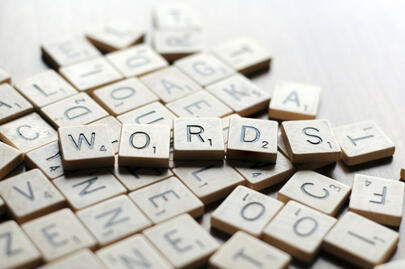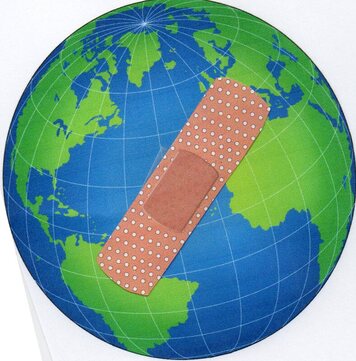all of the selves we Have ever been
 As I sat in the dentist’s waiting room, another patient arrived and took the seat across from mine. We both heard someone in the back say, “Barbara is here,” and she laughed. “You must be important,” I said. This got Barbara laughing again and reflecting on her eight-year-old great-nephew scheduled to be in an upcoming family wedding. Recently, her nephew tried on the tuxedo he would wear to the event. He looked at himself in the mirror and said, “I look like a distinguished gentleman.” Barbara delighted in describing her precocious great-nephew. I, too, love the earnestness of children, and I pictured the boy staring at himself in the mirror with his eyes full of pride and his heart filled with dreams. I waited for my own appointment dressed in amazement--amazed that there is still a child living in this crazy world today who believes that distinguished gentlemen exist! I thought the species had become extinct. I urgently wanted to find the young man to encourage this desire in him and to provide some advice before the world twists his noble ambitions. If only clothes could make the man, a massive wardrobe change would be in order. I wanted to warn this sweet child that it is not by the treasure of a man’s closet that he distinguishes himself. No, a man distinguishes himself by the treasure of his heart. Just this week more children and school staff were gunned down inside a grade school. An elected Nashville representative said there is nothing that can be done. A helpless elected official who homeschools his own children and leaves the others to perish does not distinguish himself as leader no matter what he is wearing; he reduces himself to an unwitting accomplice in the next school shooting. Do these words truly reflect the treasure of this man’s heart? I cannot bear another helpless round of “thoughts and prayers.” It is time for examination. Let us not become a culture extinguished by guns and violence. Let us be a people distinguished by the good treasure of our hearts. Let our words and actions reflect the treasures we value. Surely, our children are among them. “A good man out of the good treasure of his heart bringeth forth that which is good; and an evil man out of the evil treasure of his heart bringeth forth that which is evil: for of the abundance of the heart his mouth speaketh.” - Luke 6:45
0 Comments
 This is a week of reckoning, not only in Georgia, or the U.S. House of Representatives, or the Senate, or even the White House. This is a time of reckoning for the American people, a day to ask, “What is happening to us?” All of us. When I was a child, there was a saying, “Sticks and stones may break my bones, but words will never hurt me,” but, of course, some words did hurt. That saying was a child’s feeble response to bullying. We also tried the “I’m rubber, you’re glue; everything bounces off me and sticks to you” defense. It was something a victim might say in the moment, but, again, the words didn’t bounce; they stung. Nothing stuck to the bully, however; his damaged heart was coated in Teflon. Later, when I was a teenager opening my eyes to a wider world and to history, I studied the Holocaust in high school. I watched films and read books. How, I wondered, how could such a thing happen? The horrors were so grave, human behavior so atrocious. I could not grasp how an average citizen could become so monstrous in the treatment of neighbors, friends, and relatives. How could a leader convince an average person, a previously law-abiding person, to abandon his conscience and turn on his countrymen? As an adult social worker and therapist, I had the privilege of meeting European and Russian survivors of the Holocaust. The survivors I met were remarkable people. All of them shared how they once found the rumors of atrocities in their homelands to be unfathomable. All of them had believed that if they kept their heads down and obeyed the rules, did not draw attention to themselves, did what was asked, then right and decency would triumph. Except that it didn’t. Evil prevailed. After years of torment, the survivors were grateful to the Americans who saved them. When World War II ended, Americans settled on a belief that Hitler’s brand of evil was an anomaly, a thing of the past, “it can’t happen here” people said. In the weeks since the United States 2020 presidential election, I have felt paralyzed by the realization that it is happening here, here in the United States of America, the country that once saved the world for democracy. Prior to yesterday’s riots in the Capitol, I fretted over the bloodshed I feared was coming. My friends were more optimistic believing the worst was over. My fears this week have been informed by years of observation and study. There is a growing percentage of the population with a troubling personality type characterized by rigid thinking, an inability to consider opposing points of view, limited capacity for insight, impulsive behavior and poor self-regulation, people with only two settings--adulation or retaliation. As the need for adulation grows, the degree of retaliation escalates. These are people who become intoxicated by demeaning others. They become incapable of empathy. When psychiatrists and mental health professionals studied the imprisoned Nazi guards and elites awaiting trial at Nuremberg, the professionals determined that the guards and Nazi officials were incapable of empathy. That missing ingredient made all manner of horror possible--no shame, no regrets. No amount of facts, no album of photos, no film footage, no eyewitness report could get these prisoners to re-evaluate their actions. Their minds were rigid, their hearts impenetrable. They were made of Teflon and rubber—everything bounced off and stuck to someone else. Today, Twitter has replaced the millions of propaganda-filled leaflets that the Nazi’s once dropped from the sky like snow—the alternative news of that day. Social media has become a place where people can demean and destroy others, turn on their neighbors, and delight in mob rule. People are seduced by gossip and alternative facts on this contagious and intoxicating medium. Without direct eye contact, people lose the capacity to experience the emotional consequences of their words and actions. A light keystroke doesn’t have the same hard impact of throwing a punch to someone’s head, but it can have the same or worse effect. We are all complicit when we view, and share, and like, and tweet, and post these troubling words. It is not just the social media companies that need to police their platforms. Each of us needs to police ourselves. What goes on privately in the windmills of a person’s mind needs to stay there until properly evaluated. We need to consider the people we elevate to stardom and leadership. Social media has made it possible for people to become wealthy and powerful simply by being outrageous, liked, and viewed. At a time when educated, experienced experts are being denigrated, radio shock-jocks, and porn stars are sought for their opinions because they are “influencers” and have followers. We glue ourselves to television shows and celebrities that model degrading behavior in the kitchen, in the boardroom, or in the marriage proposal game. How did this become entertainment? What’s next? Humans being torn apart by hungry lions while we sit in the stands laughing and drinking beer? We are habituating ourselves to images, words, and behaviors that are re-shaping the human psyche and destroying our ability to feel empathy for others. People who complain about demeaning behavior on the team, in the workplace, or in social circles are often told to “let it go,” or “toughen up,” or “there’s nothing you can do.” Our parents once advised us to keep our hands and our words to ourselves. The defense, “she started it” was not acceptable. We were expected to find an exit ramp to the high road or seek appropriate help. Words do hurt. Words can be weapons. That is one of the reasons the pen is mightier than the sword. Words can cut and tear leading to a loss of limbs, a loss of life, bloodshed. Some people can shrug off the hateful words of another. Others seethe with anger and hurt and eventually use all of that negative emotion as rocket fuel on a galactic mission of destruction. We instruct preschoolers to use their words, but there is more to it than that. Choose your words before you use them. Speak truth to power and truth to evil. Avoid the temptation to join in the chatter, to like, to post, to tweet…if doing so demeans your own character or that of someone else. Hold leaders accountable for the character revealed by their words. Even a policy genius is not a worthy candidate if he or she has no conscience. If you would not want their worst behavior directed at you, don’t elect, pick, or hire them to be responsible for others. I hear from people that the situation is hopeless…”Oh, well,” they say. “There’s nothing you can do,” they say. “It’s hopeless,” they say. Hopeless cannot be the last word. The hopeless cannot have the last word. There are other words. Better words. If you are lost for words, start with these: Love your neighbor.  We are in a world of hurt. First the coronavirus surprised us, wore us down, made us tense, vigilant, exhausted. “Let’s sacrifice the old people and get back to commerce,” said some leaders. “Our black and Hispanic communities are disproportionately represented among the COVID-19 victims,” reported others. “There is a new, terrifying syndrome breaking out among children,” the scientists testified. Obese people, folks with hypertension and “underlying conditions” were included in the warnings. Health care workers fell like dominoes. News men and women broadcasted their illnesses, quarantines, and hospitalizations before our eyes. No one was deemed safe from the risk of lengthy and horrifying illness. And while we were broken and shaken, the knee came down on the neck of George Floyd. Came down on all of us. Undeniable. I am beginning to feel like I can’t breathe. And maybe that is the point. That we share the suffocating feeling. Join with our black and brown brothers and sisters in their pain, their sorrow, their outrage. Understand the weight. The burden. Everyone is raw. Perhaps the new coronavirus is a last-resort, divine intervention to help us all see and feel what it is like to live in a world where silent danger lurks in our homes, our families, our neighborhoods, our churches, our shops, our schools, our workplaces, and out on the street—to understand what it is like to live with the awareness that you are not safe anywhere. For me and for others, the current, collective circumstances have awakened memories of all of the injustices I have known and carried for myself and for others. Injustices that occurred in homes, on the playground, in the classroom, throughout the neighborhood, in church, in the workplace, the doctor’s office, and on the sports field. Injustices that occurred because of age, gender, religion, ethnicity, race, and temperament. It is overwhelming that there are so many voices, so much hidden hurt. It is like the worst possible car crash. Every organ, every bone, every bit of tissue of society is damaged. Where to begin the treatment? When the doctor asks, “Where does it hurt,” we must be able to tell the truth. We all need to be heard. When terrible things happen the frequent question is why didn’t someone speak up sooner? Noble as it may be, it is difficult to speak truth to power. There is reprisal. When even at the highest levels in the land, there is a revolving door of the dismissed, what hope is there for a common laborer or a black man on the street? Far too often, the bad guys win. The whistleblower is deemed a hysteric, a liar, a disgruntled employee. Not only do they lose their job, they lose their reputation. Their character, their divine spark is called into question. Speaking truth to power leads to disdain, disbelief, and dismemberment. People in power do it to us, but we do it to each other through social media. These powerful outlets can be a tool to bring the truth to light, but too many times, it used to destroy others. Hidden behind their screens, individuals say outrageous, hurtful, destructive things that cost people their jobs and their lives. Trolls and mobs rule. How do we stand up to this new force? When influence and a following become more important than expertise, when living in the spotlight becomes more important than truth, when desire for “likes” overwhelms right action, when pandering to a fan club becomes more important than genuine leadership, what hope do we have? When I am injured, I want to know the ER doctors have reliable knowledge, skills, tools, and experts with whom to consult and refer. I want to be able to trust that they know the right questions to ask and how to triage. I want to know that everyone brought to the emergency room gets care and reassurance. We are in a world of hurt. We need to be able to say that we are hurting, where it hurts, and what caused the pain. Action is the only way to confirm that the truth has been heard. Leadership action once meant that the captain went down with the ship. Such a potential outcome provided motivation for getting everyone out alive. In that scenario, the exercise of duty to others and to self is one and the same. We are hungry for leaders of moral courage, leaders who are part doctor, part captain, social healers who can dig down and find the truth, stop the bleeding, right the ship, and steer the course. Is there anyone out there--on duty or on vacation--who can get us out of this world of hurt? |
AuthorLilli-ann Buffin Archives
July 2024
Categories
All
|
 RSS Feed
RSS Feed